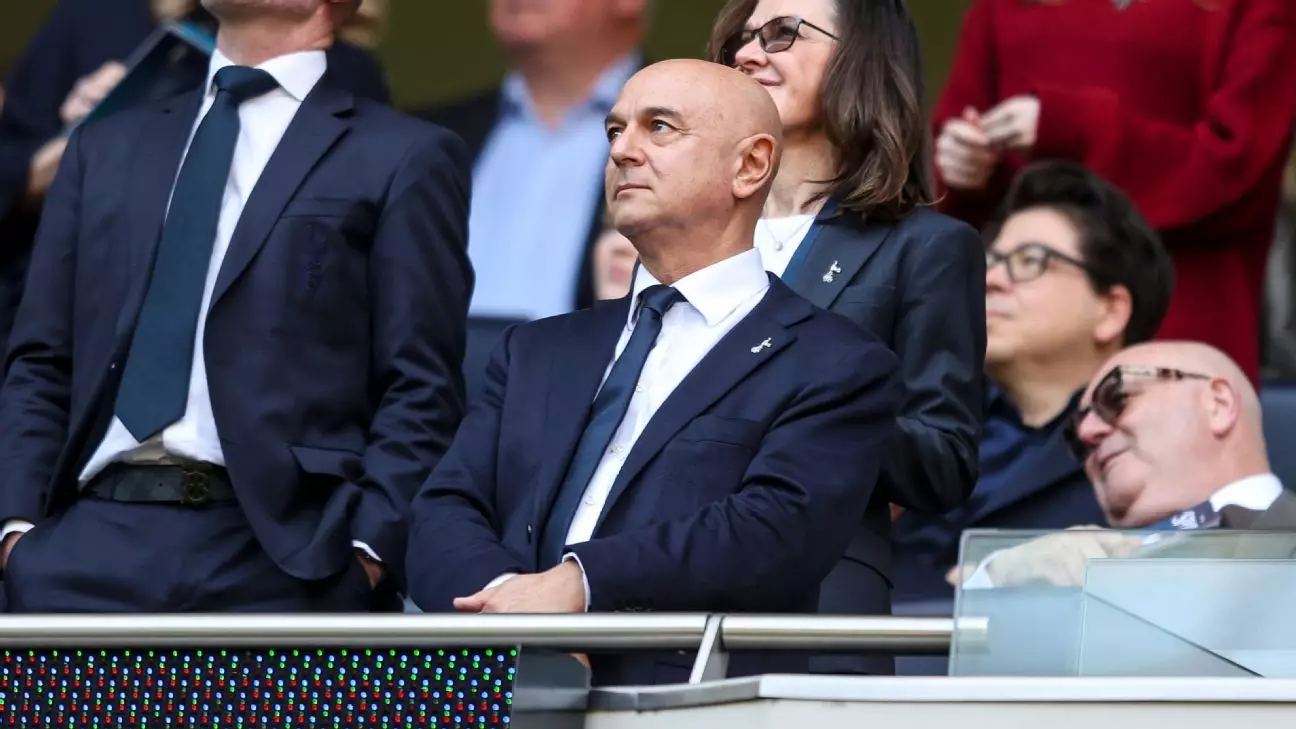Tottenham Hotspur, once a formidable competitor in English football, finds itself traversing a particularly rocky path this season. Currently positioned disappointingly at 14th in the Premier League, the team’s performance has not lived up to its potential or expectations, resulting in an outcry from fans who are accustomed to more illustrious days. Supporters have voiced their frustrations not only at the lackluster league standing but also at the perceived hesitance of the club’s administration, particularly under the watch of chairman Daniel Levy, to engage in robust financial spending in pursuit of talent.
Fans rightfully expect a club of Spurs’ stature and financial power—the ninth richest club in the world—to invest in elite players who can bolster the team’s chances of both domestic and European success. The disparity between Spurs’ commercial income and its on-pitch achievements has sparked tension. Levy’s latest statements reveal the simmering urgency within the organization as they grapple with responsibilities to both financial sustainability and team performance.
Defending Financial Decisions
In a recent statement accompanying the club’s financial results, Levy defended his strategy regarding player acquisitions, emphasizing that investments made are not merely for immediate impact but are strategically planned with the long-term viability of the club in mind. “Since opening our new stadium in April 2019, we have invested over £700 million net in player acquisitions,” Levy stated. He insists that the focus remains on making financially sound decisions that would ultimately benefit the club in the years to come, reiterating that they cannot expend resources beyond their means.
Such a defense may resonate with some fans who understand that a financially robust club makes for a sustainable future. However, the bitter pill for many supporters to swallow is that this prudent approach hasn’t translated into tangible success on the pitch. The historic challenge of balancing fiscal responsibility with competitive ambition continues to loom over the club.
A Season of Change Amidst Despair
Ironically, despite the current malaise, the 2023-24 season began under a cloud of optimism with the arrival of manager Ange Postecoglou, who guided Spurs to a fifth-place finish in his inaugural season. The club saw an influx of exciting new players such as Micky van de Ven, James Maddison, and Brennan Johnson, bringing renewed hope. All of this was overshadowed by the departure of talisman Harry Kane to Bayern Munich, a seismic shift that left a notable void in both skill and presence.
The current campaign, however, has brought about a sobering realization. A combination of injuries and erratic form has plagued the team, leading them to lose a majority of their matches. In stark contrast to the excitement of Postecoglou’s first season, the spirit seems dampened as frustration once again brews amongst the loyal fan base. The season’s bitterness is further compounded by the fading shadow of a 17-year trophy drought, with only the Europa League remaining as a beacon of hope.
Women’s Team: A Struggle for Glory
The struggles extend beyond the men’s team as the Tottenham Hotspur women, who recently made headlines by reaching the FA Cup final under coach Robert Vilahamn, also find themselves in a precarious position. Sitting ninth in the Women’s Super League table, their performances have not matched the expectations set by their successful run just the season prior. Speculation about Vilahamn’s future only adds to the uncertainty enveloping the squad.
By no means isolated incidents, these struggles are representative of a broader narrative impacting both sections of the club. The promise of silverware and glory seems to elude the club, coated in the frustration of unmet expectations. The pressure builds as both teams look to salvage what remains of the season; the men will face Chelsea shortly, while the women hope to regain form against Aston Villa.
The Fight for Stability
In such challenging times, the resolve and patience of supporters are severely tested. The voices of dissent advocating for heavier spending reverberate through the stadium, while those who understand the imperative of financial prudence caution against reckless decisions. The debate brings to light an essential question of identity: what does Tottenham Hotspur aspire to be?
What is clear is that for the club to emerge from its current predicament, a collective strength is needed—one that encompasses both the fan base and the management. The chance to clinch the Europa League remains a plausible pathway to redemption, and Spurs must channel all their resources into navigating these critical junctures. The financial tightrope will always require careful walking, but the ultimate aim should not be lost: to restore the club to its former glory while securing a bright future for the next generation of players and fans alike.

